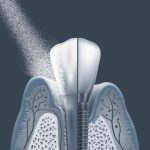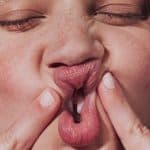The truth is, bad breath is universal. No matter how healthy you are or how well you brush, floss, and gargle you still carry the germs that cause unpleasant smells in your mouth.
The Science of Bad Breath
Bad breath is basically caused by anaerobic sulfur-producing bacteria. These bacteria are naturally occurring. They live within the surface of the tongue and throat but are nothing to worry about . These bacteria are supposed to be there because they assist humans in digestion by breaking down proteins. Proteins are commonly found in food, mucous, blood, and in diseased or “broken-down” oral tissue. Not a very pretty picture, but this is the science of what happens in your mouth.
Under certain conditions, these bacteria begin to break down proteins at a very high rate. Proteins are comprised of amino acids, two of which (cysteine and methionine) are dense with sulfur. When bacteria break down proteins into amino acids at an increased rate, more sulfur is produced resulting in chronic bad breath or “halitosis”.
As bacteria feasts on proteins in your mouth sulfur compounds are released from the back of the tongue and throat. Bacteria excretes odorous waste and bad tasting compounds. These smelly substances are called volatile sulfur compounds (VSC). Volatile means vaporous and effervescent, two adjectives which accurately describe their ability to offend other people instantly. As long as this process continues unchecked, your breath gets worse and worse.
Finding a Solution to Prevent Halitosis – Bad Breath Remedies
The bacteria responsible for bad breath is not an infection, a ”˜disease’ or a sign of poor health or hygiene. Everyone has the same group of bacteria in their mouth. You cannot “catch” bad breath from someone else, even by kissing. It’s due to a combination of the rate of bacterial protein breakdown in your mouth and the quantity of food that are the driving causes of worsening breath. Since they are part of our normal oral flora, you cannot permanently remove these bacteria from your mouth – not by tongue scraping, antibiotics, or rinses which claim to “lift the bacteria off your tongue.”
The only scientifically proven and clinically effective method of halting halitosis is by attacking the bacteria’s ability to produce VSCs and by converting the VSCs into non-odorous and non-tasting organic salts. Simply put, the rate at which bacteria digest protein and excrete waste has to be slowed, and the waste that is produced has to be neutralized. This is rarely effectively accommplished by mint flavored rinses, toothpastes, tongue scrapers, etc.
See your dental professional for more information on clinically proven, dentist prescribed therapies for the long term treatment of halitosis.







